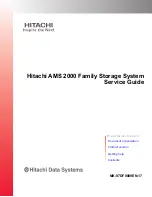
Chapter 7: BIOS
7-5
Type
Select the type of device connected to the system. The options are Not Installed,
Auto
, CDROM and ARMD.
LBA/Large Mode
LBA (Logical Block Addressing) is a method of addressing data on a disk drive.
In the LBA mode, the maximum drive capacity is 137 GB. For drive capacities
over 137 GB, your system must be equipped with a 48-bit LBA mode addressing.
If not, contact your manufacturer or install an ATA/133 IDE controller card that
supports 48-bit LBA mode. The options are Disabled and
Auto
.
Block (Multi-Sector Transfer)
Block Mode boosts the IDE drive performance by increasing the amount of data
transferred. Only 512 bytes of data can be transferred per interrupt if Block Mode
is not used. Block Mode allows transfers of up to 64 KB per interrupt. Select
"Disabled" to allow the data to be transferred from and to the device one sec-
tor at a time. Select "Auto" to allows the data transfer from and to the device
occur multiple sectors at a time if the device supports it. The options are
Auto
and Disabled.
PIO Mode
The IDE PIO (Programmable I/O) Mode programs timing cycles between the
IDE drive and the programmable IDE controller. As the PIO mode increases, the
cycle time decreases. The options are
Auto
, 0, 1, 2, 3, and 4. Select Auto to
allow the AMI BIOS to automatically detect the PIO mode. Use this value if the
IDE disk drive support cannot be determined. Select 0 to allow the AMI BIOS
to use PIO mode 0. It has a data transfer rate of 3.3 MBs. Select 1 to allow the
AMI BIOS to use PIO mode 1. It has a data transfer rate of 5.2 MBs. Select 2 to
allow the AMI BIOS to use PIO mode 2. It has a data transfer rate of 8.3 MBs.
Select 3 to allow the AMI BIOS to use PIO mode 3. It has a data transfer rate
of 11.1 MBs. Select 4 to allow the AMI BIOS to use PIO mode 4. It has a data
transfer rate of 16.6 MBs. This setting generally works with all hard disk drives
manufactured after 1999. For other disk drives, such as IDE CD-ROM drives,
check the specifi cations of the drive.
S.M.A.R.T. For Hard disk drives
Self-Monitoring Analysis and Reporting Technology (SMART) can help predict
impending drive failures. Select "Auto" to allow the AMI BIOS to auto detect
hard disk drive support. Select "Disabled" to prevent the AMI BIOS from using
the S.M.A.R.T. Select "Enabled" to allow the AMI BIOS to use the S.M.A.R.T. to
support hard drive disk. The options are Disabled, Enabled, and
Auto
.
Summary of Contents for SUPERSERVER 6014L-M4
Page 1: ...SUPER SUPERSERVER 6014L M4 USER S MANUAL Revision 1 0...
Page 5: ...v Preface Notes...
Page 10: ...x Notes SUPERSERVER 6014L M4 User s Manual...
Page 18: ...1 8 SUPERSERVER 6014L M4 User s Manual Notes...
Page 27: ...Chapter 2 Server Installation 2 9 Figure 2 4 Accessing the Inside of the SuperServer 6014L M4...
Page 32: ...3 4 SUPERSERVER 6014L M4 User s Manual Notes...
Page 62: ...5 26 SUPERSERVER 6014L M4 User s Manual Notes...
Page 70: ...6 8 SUPERSERVER 6014L M4 User s Manual Notes...
Page 100: ...B 8 SUPERSERVER 6014L M4 User s Manual Notes...
Page 106: ...C 6 SUPERSERVER 6014L M4 User s Manual...
Page 120: ...C 20 SUPERSERVER 6014L M4 User s Manual Notes...
















































